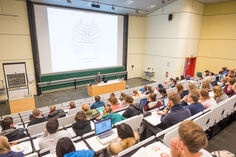- Studies
- Overview DFG-Projects
- Legal matters
- Data Protection
- Quality Management
- CTIS Management
- IT and Information Security
- Fees
- Meeting dates
- About us
- Contact
About us
About us
The Ethics Committee of the Heidelberg Medical Faculty, also hereinafter referred to as “EKHD”, was established on 25 February 1982.
It currently has members from all specialist disciplines. In addition to a physician and two lawyers, the office has another 12 employees, all of whom have a university degree and all of whom have attended a two-day course for clinical investigators. Both the Ethics Committee members and the office employees have been familiarized with their duties in a structured manner and undergo regular training.
EKHD works and signs documents electronically only, has an electronic submissions platform for Studies according to Sec. 15 of the Professional Code of the State Medical Association and a well-equipped and structured IT landscape. Studies are managed using an Access database with investigator and center management, deadline management, a key performance indicator system and accounting features.
Since 2007 furthermore, EKHD has been certified according to DIN EN ISO 9001 (as the first ethics committee in Germany) and in addition to its established quality management system, it implemented a risk management system in 2015 pursuant to ONR 49001 or ISO 31000, respectively. Since 2019 EHKD has, moreover, been certified according to DIN EN ISO 27001.
Nearly 1000 studies are submitted to EKHD annually, of which 160 are subject to the German Medicinal Products Act.
Our trademark: a process-oriented workstyle and an open communications and information culture.
Areas of responsibility
The Ethics Committee has the duty of ethically and legally assessing the research projects on humans, or on deceased individuals, as well as projects involving epidemiological research utilizing personal data that are conducted at the Heidelberg Medical Faculty, one of its facilities or by a member of the Medical Faculty and to give advise to the parties responsible.
Furthermore, it executes the tasks assigned to an ethics committee by law. These include in particular but are not limited to the duties pursuant to the Act on the Councils for the Medical Professions of the State of Baden-Wuerttemberg (Heilberufe-Kammergesetz); the Medicinal Products Act; the Act on the Implementation of Union Regulations concerning Medical Devices (MPDG) or the Medical Device Regulation, respectively; the Transfusion Act as well as the Radiation Protection Act and the Radiation Protection Ordinance as amended; and supplementary ordinances and bylaws. Studies involving somatic cell therapy, gene transfers and genetically modified organisms are also the subject-matter of an assessment by EKHD. Furthermore, EKHD may act upon the application of a member of Heidelberg University who does not belong to the Medical Faculty.
The Ethics Committee undertakes its work on the basis of applicable laws and the relevant professional codes, including the scientific standards. EKHD considers pertinent national and international recommendations.
Depending on the applicable legal requirements, the Ethics Committee expresses itself in the form of a favorable opinion, an unfavorable opinion, a corresponding vote, or another statement.
Independent of the decision of the Ethics Committee, persons responsible for the respective research project remain responsible for their project and its implementation and for their involvement.
- Studies
- Overview DFG-Projects
- Legal matters
- Data Protection
- Quality Management
- CTIS Management
- IT and Information Security
- Fees
- Meeting dates
- About us
- Contact



![[Translate to English:] [Translate to English:]](/fileadmin/_processed_/9/b/csm_Firefly_Abstract_organic_flow_resembling_blood_vessels_shaped_as_a_tool__composed_of_glowing_651800_26778ea790.png)
